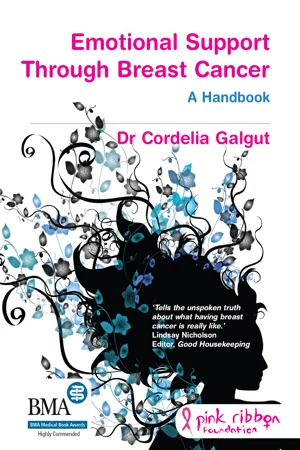
- 80 pages
- English
- ePUB (mobile friendly)
- Available on iOS & Android
Emotional Support Through Breast Cancer
About this book
This compassionate guide presents an array of new perspectives on the emotional effects of breast cancer and includes many personal testimonies from women who have been diagnosed with this disease. Written by a breast cancer survivor and practising psychologist, it shares practical ideas to help support sufferers at all stages, be it at diagnosis, during treatment or during life after the initial treatments are over. The concise, easy-to-read format includes exercises to develop an acceptance of thoughts and feelings, whilst the individual accounts validate the multitude of emotions felt by sufferers. It is a must for all breast cancer patients and sufferers, their families and friends. Its real-life approach, using first hand accounts, is also highly recommended for all health and social care professionals wanting a fresh approach to managing the emotional impacts of breast cancer. The shock of being diagnosed with breast cancer is hard to describe in words, as anyone who has had to suffer this diagnosis knows. Until it happens to us, we cannot really know how it feels. Not only do we have to deal with the diagnosis and subsequent treatments, but also we have to deal with the fact that breast cancer profoundly affects how we feel about ourselves as women. From the Introduction
Frequently asked questions
- Essential is ideal for learners and professionals who enjoy exploring a wide range of subjects. Access the Essential Library with 800,000+ trusted titles and best-sellers across business, personal growth, and the humanities. Includes unlimited reading time and Standard Read Aloud voice.
- Complete: Perfect for advanced learners and researchers needing full, unrestricted access. Unlock 1.4M+ books across hundreds of subjects, including academic and specialized titles. The Complete Plan also includes advanced features like Premium Read Aloud and Research Assistant.
Please note we cannot support devices running on iOS 13 and Android 7 or earlier. Learn more about using the app.
Information
What affects how we feel through breast cancer?
Prognosis
Treatment
It runs counter to any principle of self-preservation.1
Myths about treatment
MYTH: These days, chemotherapy and radiotherapy are easy treatments to cope with.
Not enough preparation and warning is given to patients about not only the immediate effects, but also the long-term effects I’m still feeling now. I felt I wasn’t prepared enough for my radiotherapy treatment, it was almost glossed over and expected to be ‘a walk in the park’ compared to the 8 sessions of chemo I had just undergone. When taking into account how weak your body and mind are from the treatment you have just finished, the radiotherapy is then everyday. I found it exhausting just getting to and from my appointments, but mentally and emotionally I was reminded about my illness every day. For 28 days, my life consisted of nothing but cancer, machines and doctors – it didn’t seem such a walk in the park!
The treatments were not easy, but I felt better physically than I expected to. It was the emotional effects that got me. They hit me out of the blue. Nobody had told me I’d feel so at the mercy of the machinery and the people organising the treatments, and I still haven’t got over that.
I was diagnosed with breast cancer in May 2001, and had surgery followed by a course of chemotherapy and radiotherapy. The chemotherapy made me feel pretty awful, tired, drained of all energy, but I was prepared for that and admit it wasn’t as bad as I thought it would be. I was less prepared for how bad the radiotherapy sessions made me feel. I had to drive about 45 minutes every afternoon for the treatment, and sometimes struggled to get home again. After the sessions I would feel dizzy, my legs would feel as if they wouldn’t hold me up and I felt nauseous. You don’t generally hear that radiotherapy will make you feel ill, and feel that it should be a breeze, but I would say it was almost as hard to get through as the chemo.2
I wish that someone had talked to me about the treatment in advance, that someone had explained exactly what would happen, what position I would have to lie in, how the radiotherapists would have to concentrate all their attention on ensuring that the position was correct and would have no time to be concerned about the emotional impact on me, and especially if someone had told me of the feelings that could arise for me. I know now that not everyone experiences radiotherapy as such a brutal and traumatic treatment. But it would have made such a difference if someone had told me that I might feel disempowered, exposed, controlled, violated, victimised. Because that is how it felt, but for a long time I thought I was the only person in the world who had ever felt this way because of this treatment. I thought I was going crazy. If only someone had prepared me, if only someone had told this truth.

Enduring emotions
The fear of cancer returning is something you never get used to. I get irritable, angry and at times often irrational when it comes close to my 3-month check-up. It’s not even something I consciously put myself through, it’s just always there in the back of my mind.
MYTH: You should be over breast cancer by now – it’s not normal.
Table of contents
- Cover
- Title Page
- Copyright Page
- What People Say About this Book
- Table of Contents
- About the author
- Acknowledgements
- Introduction
- Why I have written this book
- About this book
- Moving on
- What affects how we feel through breast cancer?
- Why can people, including those of us with breast cancer, often act as if breast cancer is easier to live with than it is?
- Relationships
- Is this fear of cancer/ breast cancer made worse by anything else?
- Why can having breast cancer make us feel bad about ourselves?
- Long-term effects of treatment
- Further reading
- Just diagnosed
- References